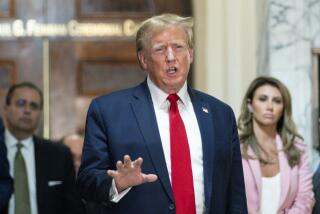Opinion: Donald Trump is having a Louis XIV moment. He considers himself above the law
With the lawsuit he filed on Thursday against Manhattan Dist. Atty. Cyrus Vance, Jr., President Trump seeks to set himself above the law. Like Louis XIV of France, he seems to believe “l’état c’est moi.”
The lawsuit asks the court to block a grand jury subpoena Vance served on the Trump organization and Trump’s outside accountants to obtain eight years of tax returns, including those from five years before he took office.
Vance claims that the Trump tax returns may, among other things, be relevant to his investigation of 2016 payments to Stormy Daniels, allegedly to keep her from talking about an alleged sexual relationship she had with Trump a decade earlier.
It’s hard to see how even Clarence Thomas could side with Trump on this one.
The law makes it very clear that presidents are not immune from criminal prosecution, and the Supreme Court held in a case involving Richard Nixon that a sitting president could be subpoenaed for documents in a criminal investigation.
More recently, that point was made twice in the Mueller report, a document Trump has repeatedly said exonerated him. “The conclusion that Congress may apply the obstruction laws to the President’s corrupt exercise of the powers of office accords with our constitutional system of checks and balances and the principle that no person is above the law,” the report says. It goes on to say that “the protection of the criminal justice system from corrupt acts by any person — including the President — accords with the fundamental principle of our government that ‘[n]o [person] in this country is so high that he is above the law.’”
Trump filed similar legal actions, now pending in the U.S. 2nd Circuit Court of Appeals, to block subpoenas issued by the House of Representatives. Those subpoenas involved Deutsche Bank, which has lent Trump’s real estate company hundreds of millions of dollars over the years. Reportedly, Trump still owes the bank $360 million, and lawmakers have said they are seeking the records as part of an investigation into possible “foreign influence in the U.S. political process.” In his lawsuit seeking to block those subpoenas, Trump argued that the House sought his returns for improper political purposes, and that such an inquiry is solely the province of the executive branch, which he heads.
In the case challenging the Vance subpoenas, Trump makes a lame attempt to claim, without support, that Vance is in league with House Democrats, but it just won’t wash. Nor can he plausibly claim there are issues with the federal balance of power. Vance is a state court prosecutor, and his jurisdiction is criminal violations of state law, not federal law. Trump’s position as head of the executive branch and as the nation’s top law enforcer should be irrelevant. Still, Trump’s lawyers say that the Vance subpoena raises “significant constitutional issues.”
The suit argues that, as head of the executive branch of the federal government, Trump cannot be investigated by a separate sovereignty, namely, the state of New York, so long as he is in office.
Trump’s lawyers are right about one thing. There is, as they claim, a significant constitutional issue. It is that no one is above the law. For that reason, Trump should lose both the Deutsche Bank case and the Vance case. If he wins anything, it will be distraction and delay.
James D. Zirin is a lawyer and the author of the forthcoming g book, “Plaintiff in Chief — A Portrait of Donald Trump in 3500 Lawsuits.”
More to Read
A cure for the common opinion
Get thought-provoking perspectives with our weekly newsletter.
You may occasionally receive promotional content from the Los Angeles Times.






